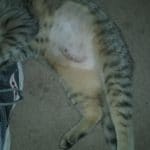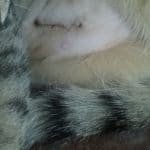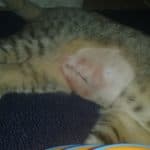Hello,
I’m so sorry for your loss. And thank you for the kind words. This place is a labor of love and it’s really nice to feel appreciated. We all know how incredibly hard it is to say goodbye. We have all been there and we empathize completely. . I hope you have a nice holiday. And we all wish you well.
I am so lost in caring for my Chihuahua/dachshund mix. She was diagnosed with IVDD on Sunday December 15, 2019. Surgery was not an option financially so we opted for conservative treatment combined with acupuncture and the Assisi loop treatments. The one thing I can not get a definitive answer on if she needs to 24/7 cage rest of if letting her rest with us on the couch in the evenings okay. Some blogs says strict cage rest for 8 weeks and only out for potty time while many others suggest other treatment plans. I just want to know if I am hurting my fur baby by letting her rest on the couch with me or not. Since the start of her treatments she has gone from full paralysis in her hind legs and being in continent to being able to walk a little and has full control over her bladder/bowels in just a little over a week!
Comments
I wanted to thank everyone who gave me advice for my baby. On 12/14/19, my baby took his last breath here and got his set of wings. He is no longer suffering anymore. I am trying so hard to convince myself of this as I feel so many things right now and the immense sadness is just overwhelming. Thank you again.
Comments
I have a 4 year old miniture dachshund that suddenly couldn’t walk anymore we took him to the emergency room and they took some x Ray’s and stated that there were a couple disks that looked concerning. We were told to keep him in the cage for 4 weeks and see how things go 2 days he seems worse so we took him to the vet and they said make sure that he continues to eat and drink and urinate. IVDD surgery seems like one of our only options however, I dont want it to fail and have him be in more pain any suggestion?
Comments
My 18 month old Tonkinese cat is blocked. Not fully but mostly. I can express drops at a time. He’s dehydrated and his levels are a little off. He’s had bloodwork and urinealysis done. We need to get him unblocked and we don’t have thousands of dollars ????????????
Comments
I just had my 5 month old kitten spayed on Friday Dec 13, 2019. On Sunday there was a good amount of bruising. Today is Thursday and day 6 of recovery and there is a bump a little smaller than a ping pong ball that is under the stitch line. Does this look like it is just a fluid sac or do you think a hernia? She runs, jumps, is and has been very active, eats, pee, poop, everything else is normal. I push on it and no reaction from her, there is no fever to it either.
First picture is the bump on day 6. Second picture is her stitches on day 6 of healing. Third picture is what her belly looked like on Day 2 and 3 after spay.
Comments
Hi Dr Magnifico. Our once feral cat Daisy has been going to her litter box all day every 2-5 minutes trying to urinate. Only a small drop or two comes out. She looks like she is in pain. We brought her in a couple years ago for this. She is extremely hard to get in a carrier or trap to bring her in and she is untouchable, she is still very feral like.
Can you prescibe the same thing she was prescibed before? I am going to have a very hard time getting her in a carrier or trap to bring her in, and she needs medication ASAP.
Terri Stiffler
Comments
My dog is13 1/2 years old. He is a dachshund/German Shepard mix. More dachshund. He has 5 fatty tumors that have all been biopsied and are not cancerous. They do seem to continue to grow in size. Not substantially but still grow. He had to go In for emergency surgery 2 years ago from cutting his artery in one of his paws during a walk. He has been a little different since then. More afraid of things. Urinates in the house every so often. I don’t know if it is from the surgery or just his age. But my question is whether or not I should have his Tumors removed with his age and how he responded to his last surgery. He is in very good health except for one health issue one time. A year ago he fell down and couldn’t walk. Took him to the vet. They kept him over night. They said it was old dogs disease. It went away 2 days later and hasn’t returned. Other than that he is very healthy. Gets his vaccines, heart worm, tick and flea meds. So do I remove them at his age or leave them alone. I keep debating this in my head and can’t make the call. I want what is best for him. I just don’t want to chance issues with going under anesthesia.
Any advice would be greatly appreciated. Thank you
Comments
My dog was Originally prescribed Gabapentin (50mg) every 12 hours but when I went back to the vet they allowed Me to do every 6 hours instead because pain seemed to be coming back faster. Now it seems the pain meds are not helping at all even with putting him to sleep. Can I give it even sooner than every 6 hours? My dog is 8.10 lbs.
Comments
I have a 12 year old female cat. She was obese for several years. I managed to get weight off of her a few months before these issues. There has been a lot of urination outside of the box. The urination has been going on a long time and initially I thought it was behavior because I adopted a rescue dog in October 2018 she hasn’t been thrilled about the dog. Right around the time my cat turned 12 she started with the urination… February or March.
In the last couple of weeks her thirst increased significantly. Also just laying on her side on the floor, not wanting to be in her bed or on the furniture. She’s losing weight /muscle mass and she is hoarse. She is still eating, I had to coax her a bit one day so I made chicken broth from drumsticks she’s been drinking a good amount of the broth and ate chicken and her canned food. She’s actually been gulping the food down.
I can’t tell if this is kidney related or diabetes. I have not noticed bad breath. I am in a real bind and need to figure out what else to do for her till I can get money for a vet.
Comments
I just got back from the vet. Basically the vet told me there’s no point in going to the neurologist if I’m not considering surgery and there’s no point of an MRI because once again I’m not considering surgery. He prescribed Tramadol along with the galliprant and Gabapentin he’s already taking . I just gave it to him now. I also asked about rehabilitation. He told me that he has seen improvements with acupuncture however he did tell me that I need to consider his quality of life. He told me if he was going to get better he would have already shown signs of improvement .im so heartbroken right now. I’m not sure what to do.











Good morning. Dr. Magnifico has a lot of videos posted on YouTube that may be helpful to you. She has a lot of experience with IVDD and has posted blogs about it as well. Don’t give up- especially since your pup is showing improvement. Best of luck to you guys!
In my opinion it is 24/7 cage rest unless they are in your arms ( while you are awake) or outside going potty. No expeditions. Ever. Because one accidental anything can result in reinjury and loss of any healing you have gained. I hope this helps and I wish you the best of luck.